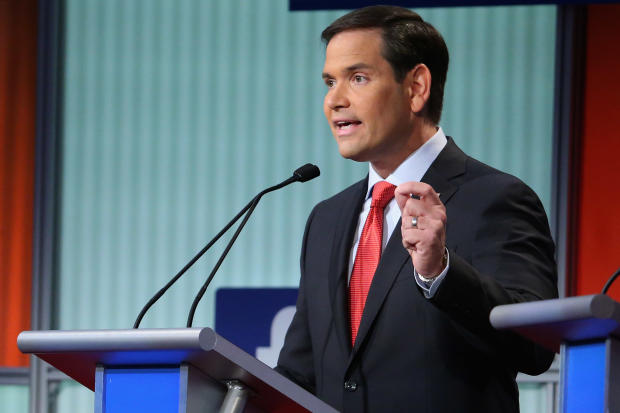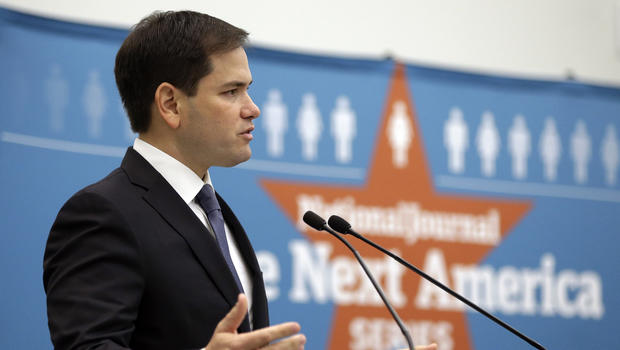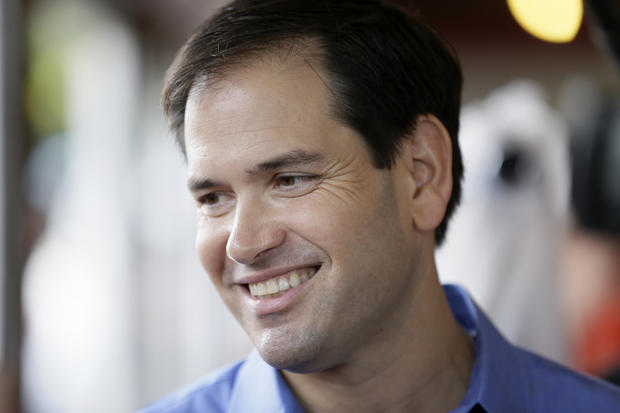Marco Rubio: What does he stand for?
As he campaigns for the Republican presidential nomination, Florida Sen. Marco Rubio has pitched himself as the candidate of the future- a fresh face for the GOP who will bring a fresh approach to policy problems that have long been frozen in place by partisan warfare.
On domestic issues like education and the economy, he's carved a fairly standard GOP profile, embracing private school vouchers and tax cuts while opposing Common Core education standards and Obamacare. He's been reliably conservative on social issues like abortion and same-sex marriage, and his approach to foreign policy tends to be more hawkish.
One notable sticking point for Rubio among conservatives has been his stance on immigration. He sponsored a comprehensive reform bill that included a path to citizenship in 2013, and he's since backed away from that effort, but he's continued stressing the need to overhaul U.S. immigration policy.
Thus far, his approach has earned him a solid - but not dominant - placement in early primary polls, behind more high-profile candidates like Jeb Bush and Donald Trump, but ahead of a number of lesser-known contenders.
Here's a look at what Marco Rubio stands for:
Education
Rubio, like many Republicans, has generally pushed for a small federal role in education policy. He opposes Common Core state education standards, arguing they began as a "well-intentioned effort" to raise standards but have since become a tool for the federal government to set curriculum. He has called for programs like Head Start to be turned over to the states for the sake of "flexibility."
Rubio has also embraced the school choice movement, sponsoring several measures to expand the use of vouchers and charter schools. As a state lawmaker in Florida, Rubio helped then-Gov. Jeb Bush implement the "A+ Education Plan," which expanded school choice and implemented a statewide grading system for public schools.
On higher education, Rubio, who only recently paid off roughly $100,000 in student loans, has said students need "more information" on the costs and benefits of the student loan offers they're perusing. He's also said the student aid system should not "discriminate against programs that non-traditional students rely on --like online courses, or degree programs that give you credit for work experience."
He's cautioned against "stigmatizing" vocational education, noting that many people can obtain good jobs without a four-year college degree - and that many people with a four-year degree can still struggle.
"We should tell students if you graduate with a major in Greek philosophy you're going to struggle to find a job because the market for Greek philosophers is tight," he said in February.
Immigration
A son of Cuban immigrants, Rubio was one of the chief sponsors of a comprehensive immigration bill in 2013 that allocated significant new resources for border security and law enforcement, revamped the U.S. visa system, and, most controversially, included a path to citizenship for undocumented immigrants living in the U.S.
That bill passed the Senate but was never taken up by the GOP-led House, and Rubio faced significant backlash from the conservative base for his starring role in the process.
He's since backed away from that effort, saying he learned reform cannot be done comprehensively - that the U.S. must secure the border first before trying to revamp other aspects of immigration policy.
"What I've learned is you can't even have a conversation about that until people believe and know...that future illegal immigration will be controlled," he said at the Conservative Political Action Conference in February.
Still, Rubio has not disavowed the need to overhaul the system, and he's argued Mr. Obama has actually set back the cause of legislative reform by taking executive action to adjust U.S. immigration policy.
"I continue to believe our system needs to be reformed and I've learned in the last year that because of such an incredible distrust of the federal government no matter who's in charge," Rubio said last August.
Economy
Rubio has generally embraced the conservative creed of low taxes and low regulation, but he has not embraced the "flat tax" proposals that some primary competitors have offered.
Instead, he's campaigning on a plan he and Utah Sen. Mike Lee authored in the Senate that would, among other things, slash the corporate rate from 35 percent to 25 percent while eliminating many business tax deductions, simplify the personal income tax code by creating just two brackets (15 percent and 35 percent), and create a new $2,500 child tax credit. The plan would also do away with estate taxes and reduce taxes on investment income.
Rubio, like all of his GOP colleagues, has also called for Obamacare to be repealed and replaced. Earlier this month, Rubio described his alternative plan in an op-ed for Politico. In it, he wrote, he would create an "advanceable, refundable tax credit" to help Americans afford insurance, reform insurance regulations to "lower costs, encourage innovation, and protect the vulnerable," allow Americans to purchase insurance across state lines, and expand the use of health savings accounts.
On health care entitlement programs, Rubio has said he'd ensure their long-term solvency by block-granting Medicaid to the states and converting Medicare for future generations into a premium support system while preserving the current system for today's seniors.
Rubio supports the Trans-Pacific Partnership, a massive pending free trade agreement, saying it would make the U.S. more prosperous and globally competitive.
He opposes raising the minimum wage, warning it could lead to job losses by encouraging "automation and outsourcing."
Social issues
Rubio, a practicing Roman Catholic, has long opposed abortion rights. In 2013, he voted for a bill that would ban abortions after 20 weeks of pregnancy with exceptions for rape, incest, and the life of the mother. He said during the first GOP primary debate, however, that he does not insist on those exemptions. In a subsequent interview on CNN, he explained the seeming disconnect: "I've never said that I will only support a bill that has an exception in it, but I will support bills that have exceptions in it because they prevent abortions. I'm here to save as many of those unborn children's lives as possible."
Rubio is also an opponent of marriage rights for gay couples, and he condemned the Supreme Court ruling that legalized same-sex marriage nationwide in June, saying the decision "short-circuit[ed] the political process that has been underway on the state level for years." He's emphasized, however, that he'll respect the court's ruling, despite his disagreements, and he's urged people on both sides of the debate to "respect" the dignity of their opponents.
On gun laws, Rubio has been a strong defender of the Second Amendment. He sponsored a bill in March that would undo the District of Columbia's fairly tight gun regulations. In 2013, in the wake of the massacre at a Connecticut elementary school, Rubio voted against a bill that would have expanded background checks for gun buyers, and he opposed a measure that would restrict the size of ammunition magazines for assault rifles.
Rubio also opposes attempts to relax marijuana laws. He has said he would use the power of the federal government to crack down on states like Colorado and Washington that have legalized pot for recreational use. He's expressed openness to legalizing marijuana for medicinal use, however, saying he'd like to see more information on the drug's therapeutic value.
Foreign policy
On foreign policy, Rubio has generally aligned himself with his party's hawks, calling for a more muscular American approach to foreign entanglements.
He's criticized President Obama's strategy to fight the Islamic State of Iraq and Syria as inadequate, warning that U.S. airstrikes won't be enough to rout the extremist group. In an appearance on CBS News' "Face the Nation" this year, he didn't rule out the possibility of sending U.S. combat troops into the fight, saying it wouldn't be "the first option," but he could envision a scenario in which it might be useful.
"The best option would be the combination of a Sunni-Arab combined army, Egyptians, Saudis, Jordanians who confront a radical Sunni group on the ground and defeat them in combination with U.S. air support, U.S. logistical and intelligence support and embedded with some U.S. special operation forces," he added.
Rubio, like most Republicans, opposes the Iranian nuclear deal, saying the U.S. and its negotiating partners granted too many concessions to Iran in exchange for a deal that does not guarantee the Iranians won't secure a nuclear weapon.
The senator has been among the most outspoken Republican foes of the U.S. rapprochement with Cuba, saying the normalization of relations between the two countries will only empower the Cuba's dictatorial Castro regime and deter democratic reforms on the island. He's vowed to vote against any attempt to lift the trade embargo, as well.


